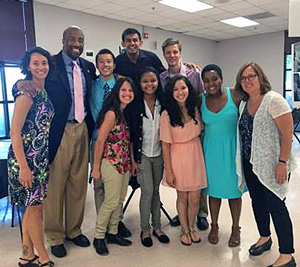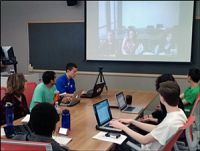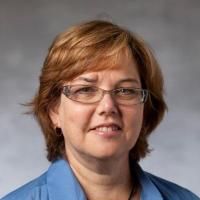Faculty Perspectives: Deborah Rigling Gallagher
Deborah Rigling Gallagher, Professor of the Practice of Environmental Policy
Bass Connections Project Team: Strengthening Community Environmental Health through Duke-HBCU Partnerships
 Professor Gallagher led a project team that explored environmental justice and community health issues in a disadvantaged neighborhood in Dallas, Texas, in partnership with students at Paul Quinn College. A plan to direct the city’s garbage to a landfill near the historically black college prompted resistance from the Highland Hills community. Residents already lacked environmental amenities such as access to a grocery store with healthy, affordable foods. Using a community-based, participatory approach, the Bass Connections team examined links between ecology, redevelopment and health and sought to define options for addressing health disparities and revitalizing the neighborhood.
Professor Gallagher led a project team that explored environmental justice and community health issues in a disadvantaged neighborhood in Dallas, Texas, in partnership with students at Paul Quinn College. A plan to direct the city’s garbage to a landfill near the historically black college prompted resistance from the Highland Hills community. Residents already lacked environmental amenities such as access to a grocery store with healthy, affordable foods. Using a community-based, participatory approach, the Bass Connections team examined links between ecology, redevelopment and health and sought to define options for addressing health disparities and revitalizing the neighborhood.
We asked her a few questions about her Bass Connections experience; below are excerpts from our conversation.
A Unique Partnership
 The idea for this project was based on a beginning partnership with Paul Quinn College. I do some work at the intersection of environmental justice and urban development, and I had a small grant from the National Fish and Wildlife Federation to do work in the community next to the college. I came up with this idea of bringing students from Duke and Paul Quinn together for the next phase.
The idea for this project was based on a beginning partnership with Paul Quinn College. I do some work at the intersection of environmental justice and urban development, and I had a small grant from the National Fish and Wildlife Federation to do work in the community next to the college. I came up with this idea of bringing students from Duke and Paul Quinn together for the next phase.
Faculty Collaborators
I heard of Bass Connections from Randy Kramer. He introduced me to Karrie Stewart, who’s a cultural anthropologist. I thought PhotoVoice [a participatory photography and digital storytelling methodology] was interesting, and Karrie had experience in it. Rebecca Vidra works on environmental equity and is an ecologist. She’s also director of undergraduate studies [at the Nicholas School], and I hadn’t taught undergrads before.
Rebecca’s an ecologist, and the way she looks at the landscape is so different from how I look at the urban landscape. She sees plants where I see overgrowth. It not only had an impact on me but on the Paul Quinn students. Working with Karrie was fabulous. She’s a great teacher.
Student Participation
 I had a PhD student who was interested in environmental justice, and we had three undergraduates from Duke and three from Paul Quinn. They were great—smart, super engaged, incredibly ambitious. I remain close to the students from both institutions.
I had a PhD student who was interested in environmental justice, and we had three undergraduates from Duke and three from Paul Quinn. They were great—smart, super engaged, incredibly ambitious. I remain close to the students from both institutions.
One Duke student with an interest in urban development and design said this really had an impact on him. Another wonderful student is interested in environmental justice, public health and equity. We also had a pre-med freshman who said this team changed his perspective on being a doctor. And a Paul Quinn student now wants to study public policy, which is my field, and that’s very rewarding.
A Transformative Experience
I’m a public policy scholar—I look at data. Karrie helped me to appreciate these anthropological methods, and I learned a lot from her. Since then I’ve done ethnographic research, which is new for me.
I think it’s really worthwhile work, and our students got to go to a geography they wouldn’t otherwise go to, and to live there and work with people. PhotoVoice was a huge success.
Bass Connections was really transformative for me. I had never lived in a disadvantaged neighborhood, and that was a great experience personally.
See other faculty perspectives and learn how you can get involved in Bass Connections.

